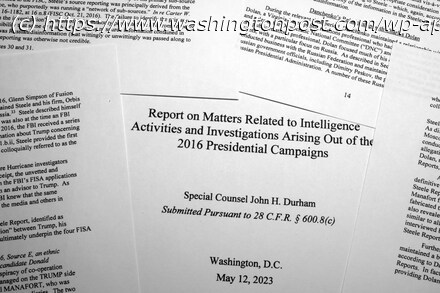Durham pointed to potentially biased juries and cited „false statements“ by two defendants who were acquitted of false-statement charges.
You could forgive special counsel John Durham for being a bit defensive in the final report recapping his years-long criminal probe of the investigation into Russia’s interference in the 2016 election and whether Donald Trump played a role.
Tasked with investigating the investigators, Durham secured just one conviction in his three prosecutions — a guilty plea resulting in probation, in a case he was effectively handed by someone else. The two other cases resulted in unanimous jury acquittals.
Despite Republican claims to the contrary, Durham’s investigation didn’t really move the needle on proving what the man who appointed him, Attorney General William P. Barr, suggested was a deliberate effort to “sabotage” Trump’s presidency. It instead rehashed much of what we already knew, and it pointed more toward “confirmation bias” by federal law enforcement than political malfeasance.
But some of the ways Durham explains those shortcomings cause prosecutorial ethics experts to blanch.
Somewhat akin to Trump and his allies, who have increasingly attacked the legal system, Durham points a finger at juries.
Early in his report, Durham seems to suggest his probe didn’t yield more significant prosecutions and convictions because it’s difficult to find juries unbiased enough.
“There are also reasons why, in examining politically-charged and high-profile issues such as these, the Office must exercise — and has exercised — special care,” Durham writes. “First, juries can bring strongly held views to the courtroom in criminal trials involving political subject matters, and those views can, in turn, affect the likelihood of obtaining a conviction, separate and apart from the strength of the actual evidence and despite a court’s best efforts to empanel a fair and impartial jury.”
As Politico’s Kyle Cheney noted, this flies in the face of how the Justice Department generally talks about prosecutorial decisions. It could certainly be read as Durham blaming jurors’ “strongly held” political views for his poor record in securing convictions and, perhaps by extension, for his decision not to seek to bring additional cases.
Barr offered similar comments last year while explaining the lack of convictions in the Durham probe.
Rebecca Roiphe, a former prosecutor who teaches legal ethics at New York Law School, acknowledged that the views of a potential jury can have an impact on a prosecutor’s decision on whether to bring charges.






